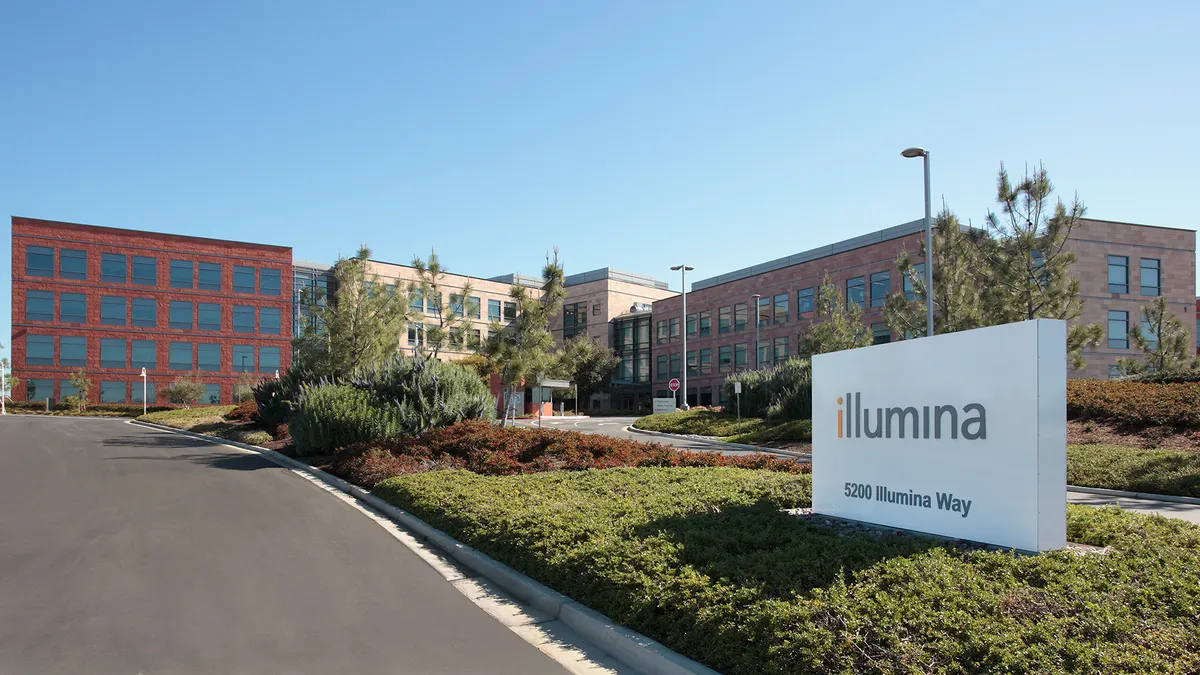Dive Brief:
-
Illumina has agreed to acquire Grail for $8 billion in a deal that could establish the sequencing giant as a leading player in the liquid biopsy market.
-
Grail spun out of Illumina in 2016 and, with the launch of its first product looming, filed an IPO earlier this month. Illumina has swept in ahead of the completion of the IPO with a cash-stock deal for the 85% of Grail it does not already own.
-
Shares in Illumina fell. Analysts at Cowen questioned whether the deal plays to Illumina’s strengths, noting that the company has struggled in the clinical space and risks creating conflicts with its customers, while analysts at SVB Leerink described the rationale for the deal as "still unclear."
Dive Insight:
Illumina's genome sequencing machines are the bedrock of the liquid biopsy sector. Yet, Illumina has played a behind-the-scenes role, providing the equipment that enables liquid biopsies but not selling the tests itself. Illumina increased its exposure to the liquid biopsy space by setting up Grail but chose to spin the business out.
Now, Illumina is planning to buy its way back into the liquid biopsy market, set to pay $3.5 billion in cash and $4.5 billion in shares to acquire Grail outright.
Illumina CEO Francis deSouza argued to investors Monday morning that the acquisition will launch a "new era" in early cancer detection, and Grail CEO Hans Bishop said Illumina's global scale and reach will give it a leg up with infrastructure and relationships to further its commercialization efforts.
The Grail deal positions Illumina to participate in what the company estimates to be a $75 billion market for next-generation sequencing oncology tests by 2035, a $60 billion-greater opportunity than without Grail, according to deSouza.
Grail's Galleri multi-cancer screening test is slated to launch commercially in 2021. Widespread adoption of the product could avert nearly 40% of the 5-year cancer mortality or about 100,000 deaths annually in the U.S., deSouza contends. And based on Grail's estimates, adoption of Galleri alongside existing screening guidelines could help reduce by up to 65% the cost of diagnostic work-ups.
Grail's go-to-market strategy for Galleri next year will include health systems, self-insured employers and concierge medicine.
Illumina expects to close the Grail transaction in the second half of 2021 and will share more detailed expectations about revenue growth and impact on earnings per share at that time.
"We consider early cancer detection to be one of the largest clinical opportunities of the next 15 years," deSouza concluded, saying the Grail acquisition is will be "additive" to Illumina's overall opportunity and growth prospects.
However, the deal was met with a frosty reception.
“We are not sure that 1+1=2 in this instance. In fact, when we factor in concerns about “competing with customers”, Illumina will need to clearly address any concerns that in this instance “1+1” could actually equal “less than 2,” Cowen analysts wrote in a note to investors.
Some skepticism of the deal notes that many factors that drove Illumina to spin Grail out in the first place are still relevant today. One reason Illumina let go of Grail was to share the financial burden of developing liquid biopsies. Grail went on to raise $2 billion.
The investment has taken Grail to the cusp of commercialization but it has plans to run more large clinical trials, suggesting its outlays will remain elevated for some time. Illumina’s balance between income and spending is likely to be very different from that of Grail for some time, leading analysts at Cowen to question if it can “optimally balance investment with margin optimization objectives.”
Spinning out Grail also spared Illumina from the conflicts it could face as both a provider of genome sequencing equipment and developer of tests that run on the devices. Cowen analysts said “almost every one of Illumina’s major clinical customers has (and many emerging customers) ambitions to develop liquid biopsy based cancer screening tools.”
If Illumina buys Grail, those customers will also be its competitors. That fact prompted the Cowen analysts to argue that Illumina needs to buy up other end users of its sequencers to mitigate the threat that its customers-turned-competitors will start sourcing equipment from its rivals. Whatever Illumina does, the analysts expect its move for Grail to commence “a new era of consolidation in the space.”
The level of competition for the liquid biopsy market means those downsides could hurt Grail. At ESMO Virtual Congress 2020, Grail presented data linking its liquid biopsy to a specificity of 100% and sensitivity of 56%. The data impressed a key opinion leader quoted by Puneet Souda and his SVB Leerink colleagues but the analysts think Natera “is in the early lead in this market given the clinical data published so far."










